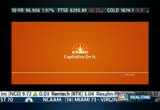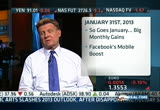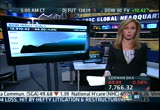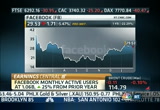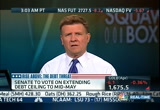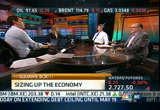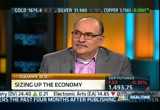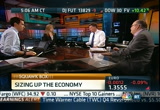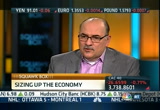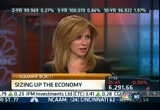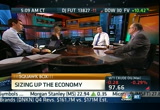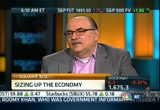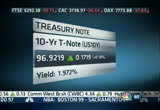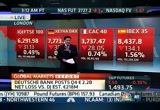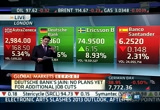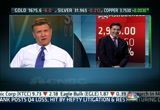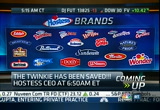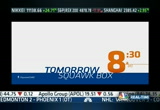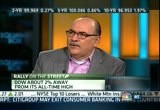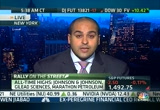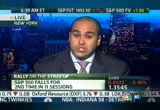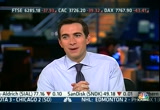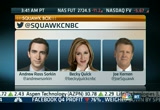tv Squawk Box CNBC January 31, 2013 6:00am-9:00am EST
6:00 am
good morning. you probably know the saying. as january goes, so goes the year. and the major averages are about to finish the month with some of the strongest gains in decades. facebook results beat the street. the social networking giant getting a boost from its mobile business but the stocks then sold off. and this is good news. a twinkie rescue. hostess has two bidders ready to
6:01 am
save the iconic brantd. it is tuesday, january 31st, last day of the month. "squawk box" begins right now. >> good morning, everybody. welcome to "squawk box" here on cnbc. i'm becky quick along with joe kernen and andrew ross sorkin. and we have a big lineup of newsmakers ahead for one including dow chemical ceo an andrew liverus, robert nardelli, mike jackson, fred smith and jeremy siegel. if the dow and the s&p 500 finish near these levels, it will be one of the best starts in decades. the dow fell away from 14,000 after the gdp report surprised investors for the decline for the fourth quarter. the index is still up 2% for the month and it is shaping up to be the best january in 24 years. the s&p 500 managed to hold on
6:02 am
to the 1500 level yesterday. that index is up 5.3% this month. will the january barometer kick in? in 61 of the last 84 years, a strong january meant a positive year for stocks at the rate of 3%. here is another statistic for you. the s&p 500 has finished january with a 5% or better gain just 11 times since 1950. in ten of those times, it finished the year with a double digit gain. the only exception was the crash year of 1987. so we have to wait until 4:00 p.m. to find out if the is he is he is on. right now, s&p futures are off about by about 3.5 points. >> that is true, becky. facebook will be a stock to watch today after they released forty quarter results. fourth quarter profits came in
6:03 am
at 17 cents a share. that's two cents ahead of estimates and revenue beat expectations in a -- coming in at $1.59 billion. the company getting a big boost from its mobile business. facebook says as of december, 680 million active users were accessing the site now on smartphones. that is up a whooping percent from 2007. the stock has been on a comeback trend. it is off in part where profits came in, where the expectation was. still, people say you have to be growing at these rapid, also crazy clips.
6:04 am
>> amazon was the story yesterday. up 23 points. they missed sp eed expectations. you say it and it's like, where am i even saying it? it's up 22 points. facebook, great numbers, down. >> the senate is expected to vote this afternoon on a bill to suspend the debt ceiling for three months, following the house. this would allow more house for debate on the fiscal issues we're facing. the senate version includes several republican amendments, though, including matching spending cuts for every dollar increase in the debt ceiling. those amendments expected to be defeated. the bill won't technically raise the debt ceiling, but it will suspend it until may 19th when it will be raised by the amount that the treasury borrows in the
6:05 am
interim. that's how it's going to work. and markets, as we've been talking about on a tear this month with the dow having its best january in decades. but will yesterday's surprising drop in gdp reign in the bulls, it says here? let's get a read on the state of the economy. at least it wasn't a -- that kind of rein. there's three of them. anyway, joining us for the next hour is bob bruska. that's fao -- >> no. you cannot. >> fao economics. as becky said at the top, things are going to go really well or the market is going to have an '87 crash. >> i like the binary outlook. >> everything you said was so good until you gout to that point. >> he usually wears one of these very clever ties. >> i'm not going to give him
6:06 am
any -- >> there you go, joe. >> you didn't forget because you are getting up there. >> up there? >> close to his age. >> i have to put it out the night before. >> i lay my clothes out the night before, too. >> do you, really? >> oh, yeah, me, too. well, my wife is sleeping. i have to do that. >> all right. so did you, when you saw the down 0.1, what was your -- did you immediately explain it away? did you express shock, chagrin, angle, denial? >> no, i don't have an ee morm attachment to gdp -- >> you cover it long enough, and i cannot say that i don't have an emotional attachment to it. when it's crappy, you know people are not going to get the jobs. and when it's good, things are good for everybody. >> it's a technical number. >> it's a tragedy that things
6:07 am
aren't growing more. >> you had a 22% drop in those earnings. big deal. and so, you know, i had a lot of people call and ask me, why did this happen? people are telling me it happened for this reason. i read the paper and it says the white house says that they think it happened because people are concerned about the next spending sequestration. and i think, what a bunch of crap. >> did obama say it was the republicans' fault? i saw that. >> i didn't see that. but these are the kinds of things, look at gdp. you can see why it fell. but then people go beyond that and ask it in some femetaphysic way. the dividend fell under pressure. but when you look at what was
6:08 am
beyond the gdp components, we had a nice spice in consumer durables. some of that was people buying cars after the storm and so they're spending insurance company money. you had a light increase in inventory compared to the first quarter. that takes some of gdp away. you know you're not going to have that consumer spending for consierms going forward. you have declines in both exports and imports and that had a solid impact on gdp. but you have to be concerned about what's going to happen with exports and, of course, st weak imports. you have to be concerned about that being weak. they're not negative year over year yet, but the flows have slowed down and having declining exports and imports really a bad sign for the economy. i look at the things that gdp have to do with trend.
6:09 am
it's the best bad gdp report you'll ever see. i don't agree with that. >> but you don't think we'll swing back to 3% growth? >> i would be surprise. >> 2%? >> we're probably in the 1.5% to 2% range. why is consumer confidence falling off the cliff by every single survey that you have? michigan, conference board, the bloomberg index, all of these indices. the consumer is in rotten shape. >> taxes maybe. >> taxes are an issue, but. >> yesterday, i was told walmart are trying to deal with this now. people are coming in to try to buy things and people are getting pennies out of their pocket. >> walmart, they were able to see that people would be coming into the shore as their paychecks came in. they were coming in really late
6:10 am
at night on a monday or whatever the cycle was. >> my brother is in food sales. he says at the end of the month, and you don't even have to go in and is visit some of the merchants. people don't have money and they're not really buying anything. there's a real cycle. >> did you hear it being used at the end of the month? i like that better than at the end of the day. >> that's underused. i hear people say at the end of the day. sometimes we ask them a question and they say it five times in the answer. every time they say it, they go, it was good that i saved it. at the end of the year, what will the toelgdz to 13 have been? >> i think around 2%. i don't think it's accelerating. i'm concerned about the impact
6:11 am
of global growth, i'm concerned about all this political stuff and i'm concerned the economy really isn't faring on all of its cylinders. people seem to think it's accelerating and i don't think that 37. >> we do think that. i think the consensus is 2% to 3%, until yesterday. >> even yesterday some people were still defending that. >> it's almost like we need -- the last four years, they see it as sort of a reaction to the financial crisis and now they think there really isn't a new normal and we deserve to grow back, even with all the stuff that the government screws up, we -- wait a minute, with a weak 2-4 basis, it's more likely that you get a bigger number now. so i mean, technically speaking the way you have the numbers together, it makes stronger growth more likely fourth quarter to kwarlt quarter. fundamentally, what does this tell but the economy? and i don't think there's that much of a silver lining in this report. >> thank you. let's take a look at the
6:12 am
mokts this morning. the fourchs are morning are indicated a little lower. dow futures down by about 22 points. yesterday, the dow dropped by 42 points. that was the third loss in the last 15 sessions for the dow. you've been killing me on that. the s&p is down for the second time in seven sessions yesterday. take a look at oil prices this morning and you'll see energy prices down about 30 cents. and at this point, the ten-year is yield iing -- trouble role, please. we're frozen at this point. yielding 1.972%. the euro yet was at a 14-month high versus the dollar. and you can see right now, the dollar is stronger against the eu euro.
6:13 am
gold prices are down by about 6.30, $1675.30 an ounce. right now, let's get to the global markets report. ross westgate is standing by in london. good morning. we haven't seen you in quite a while. you have a lot of red behind you this morning. >> we have, indeed, becky. i saw andrew more recently than i've seen you over there in davos. yeah, look, we are down. you can see decleaners outpacing the decliners. we're down at the session low. down around .0. the spanish market down 1.5%. that's down to bank stocks. they're all off heavily because of santander. santander is europe's largest lender in the eurozone. stock off 2.3% today.
6:14 am
there's 2012 net profit more than halved hurt by big losses in real estate, write-downs and property assets. also key growth spots as latin america down, as well. they're setting aside another 18 billion or 19 billion euros for provisions in 2012. they said they may still sell some more addette az. there's a lot of restructuring going on, as well. the market has been focused in on the fact that they're going to raise their capital, but they're not going to do it with raising equity. they're going to do it by retyping their risk model.
6:15 am
so a bit of relief about shareholders about that. they're beginning to shake off the global downturn. they're got a lot of expires challenging with and they're saying this year is going to be a pretty tough year ahead. that's why we stand at the moment. it's all about the corporate news today. back to you. >> ross, thank you for that. it was good to see you in davos. you have to come over here one of these days. >> you should come over, ross, for the academy awards. because all six actors that played 007 are going to be at the academy awards. you've never actually played him, but you channel him every day, basically. can you -- are you free that weekend? do you know? or you can't really talk about it? you can't really talk about where you'll be. >> we'll see. when is it?
6:16 am
>> end of february, early march usually. i don't know what the exact date is. i'll look it up and send it to you, ross. wheat get you over there. >> did you see the way he looked at it? >> the way he holds hits hands. >> and it's like, i'm not anxious to answer. >> a man of mystery. in the meantime, we're going to talk facebook. coming up, should investors like facebook shares right now? that's a like with the thumbs up, you know what i mean, or do some clicking elsewhere from profits. we're going to do some next. and you can stop ordering twinkies. the iconic pound shape has been froz frozen. we'll talk more about that at 6:50 eastern time. [ male announcer ] it was designed to escape the ordinary. it feels like it can escape gravity.
6:19 am
welcome back. u.s. equity futures down about 21 points. markets did okay yesterday and it didn't go down at 9:30 right away. it meandered around all day long. >> but the s&p did close at its lows of the session and that's something it hasn't done all year. >> what would you do if that -- if the government report said you're in a recession? if you're shrinking? nobody likes shrinkage. well, one of the stocks we're going to watch today, whirl pool, the appliancemaker reported quarterly profit of 229
6:20 am
a shares, six cents above estimates. company predicti ining earnings above the estimates. whirl pool has been able to demand hiver prices, as well, benefiting from demand. retailers don't like it? >> nope. >> shrinkage? >> unless you're on a diette, then you like it. >> george castanza does not like it. >> let get to the national weather forecast from the weather channel. alex wallace, you guys, really, is it that none of on you work more than one day a week, alex, or are you mixing it up? i could use a gig like that. >> it's all just a mixed bag. that's how we do it around here. but as we follow things this morning, it's an unsettled time for us. heavy downpours. looks like d.c., baltimore out of that rain, but boston, not the case. not only is it wet, we're talking about very, very strong
6:21 am
winds in a lot of these areas. we've already seen a wind gust in boston up to 60 miles per hour. we'll be watching that throughout the day. that's why we have wind advisories that are in place. high wind warnings up in new england. that's where we think some of those winds will be stronger at times. throughout our thursday, look at that, boston, 30 to 50-mile-per-hour winds. a little less as we head farther to the south from new york down towards philadelphia. but still, 20 to 30-mile-per-hour winds. very, very strong winds throughout the evening hours in these spots. then we head westbound to the snow, finding that all around the great lakes, even into parts of the ohio valley. these are some of the areas that were very, very warm. just 24 hours ago, cincinnati, now you're seeing some snow showers in place and the cold air mass is going to continue to final all the way down into parts of the south 37 we're talking temperatures that are going to be running 35 degrees below the average. guys. >> okay. thank you for that report. we're going to move on and talk about facebook this morning. facebook reporting fourth quarter results after the bell
6:22 am
last night. the social networking giant reportedly beat analyst estimates, delivering earnings per share of 17 cents versus street expectations of 15 cents. that's the good news. the company reported revenue of $1.59 billion versus expectations of $1.53 billion. with us now to talk about his broad outlook on the future of facebook is john steinman, president of buzz beat. good morning. >> good morning, andrew. >> what do you think of this? a beat, stock after hours is down 5%. seems to me it's mostly on the fact that they're spending a lot of money. right. i mean, the market was expecting growth of 30% to 40% and they came in saying they're going to have 50% op ex growth. what did you get for that op ex growth? now you have a great engine on search. i've been using graph search. >> search for friends like restaurants in new york and you can find all the restaurants your friends like in facebook or
6:23 am
san francisco. >> do you think it's better than using google? >> no. but i think that's what you're getting your for this -- all these things are firing on all cylinders. 2% of their revenue from mobile, they had no mobile ad revenue two quarters ago. everything the company gets asked to do, they do. and then it's never enough. >> the stock was stuck at 20 and in a quarter moved to 30. so it's down 5% today. >> but it's never enough because it's still overpriced sflp compared to linkedin, compared to amazon -- >> not compared to amazon at this point. >> who knows what's overpriced and what's not. >> but it's kind of powerful to see them move now to 65% of advertising. they moved off of people using those thumbnails on the true advertising social product. so it's working. >> we had a guy on from davos last week, from reputation.com who said that he was seeing anecdotally a sense that people were using facebook less. >> yes. but the data doesn't prove that out at all.
6:24 am
if anything, daily active users over monthly active users are at an all-time high. 59% of people that access the sight monthly now access it daily. so there's no data that supports that. >> and is there any data to support that they have cracked the code, though, on mobile advertising? >> well, zuck made a great point on the call. with those ads, becky, we talked the last time about whether or not this would now people. they found decreasing comments in likes, only 2%. so it modestly impacted the engagement on the social impact of mobile. he says they're putting a few in everybody's news each day now. they can do more. >> do you have the actually numbers of people who use it daily versus monthly? i don't even use it monthly any more. >> right now, half of those billion people access it daily. >> wow. >> yeah. it's like soda or water. that's basically what facebook is like at this point. >> but when you look at what
6:25 am
google s has done, they created a model with no real revenue behind it, but forced to use it a million times a day. will they ever beat google? when you think of the valuation that google has today, and the math behind that, do you see facebook being that? >> i don't know the answer to that, but i do see a lot of parallels. how many quarters do we have people complain about google spending? every quarter, why is google spending so much? ultimately, these are r&d intensive companies. i think graph search is a glimpse to a product that could -- >> what is graph search eventually? >> graph search may be the way you discover about things around you. you search first for your friends, you get your friends' results and then if your friends can't answer it -- >> where are you on bing, by the way? would you use bing over google? >> consumer habits get deeply engrain engrained. if you do bing searches, the results are as good.
6:26 am
>> are they better? >> i don't think you use bing unless the name changed to bada bing. i don't like it. >> if i'm going to have to go to a facebook graph search, i'm going to eat in. >> everybody is already on facebook. your not curious what restaurants your friends -- >> no. i don't want to see them. if they're there, then it defeats the purpose. >> they could have been there yesterday. >> i want reality over virtual reality. this is a virtual reality -- >> we're both old, john. we're both old. you're not going to convert us. it's not going to happen for us. >> i'll keep trying. you, are you going to use the facebook thing to find out where to eat? >> i rarely do. >> if he doesn't do it, it's not going to happen. >> do you do it? >> i used it in san francisco. also, it's great to be able to go in there and say restaurants my friends like on the upper east side. that's a great search to do. if i go to yelp or something
6:27 am
like that, it's random people. four square has it, as well. if you go to for square explorer, you'll see all the places your friends like. >> i'll try it. >> that does sound appealing. >> in a place you don't know what you're doing. >> right. >> recovery shows a soft spot. that's how the journal says it. in, times, it's down here. how about our friends in the uk? the u.s. economy in recession. they put our flag there. they're so happy because they're at minus 0.3%. so misery loves company. we're not like you and we're not going down that much. it's a brief pause for us. the financers are so happy. look, they put the flag there. >> it's what they call the splash in the uk. >> it's an orange newspaper. who cares? >> yeah. when we come back, the bulls rule in january, but will the roads start getting rougher from here? our next guest wants to prepare us. find out why from here.
6:28 am
6:29 am
we don't let frequent heartburn come between us and what we love. so if you're one of them people who gets heartburn and then treats day after day... block the acid with prilosec otc and don't get heartburn in the first place! [ male announcer ] one pill each morning. 24 hours. zero heartburn. and don't get heartburn in the first place! all stations come over to mithis is for real this time. step seven point two one two. verify and lock. command is locked.
6:30 am
6:31 am
6:32 am
welcome back. our guest hosts, bob nardelli. auto nation's mike jackson will be here and fedex chief fred smith all coming along today. last but not least, market master jeremy siegel. in the headlines this morning, it is busy for economic numbers. we're going to get the weekly jobless claims numbers that have been so significant from the labor department. we'll get that in about two hours. but you saw in the last couple of weeks, it's one of the reasons that we are all getting so optimistic. housing, europe getting better and jobless claims had us at 3% for the gdp and then, boom. >> decline. >> explain why the markets haven't, like, tanked. >> i don't think it's -- we knew it was going back to, like, 1%. that's what people thought. and then reaccelerating. so, you know, that's like the government. one minus one. maybe they messed up a decimal point. >> immediately people said it
6:33 am
might be revised. >> i was relieved with andy that he didn't believe the number. if he believed it, he would have sold obama on another 8 billion. how many have we raised? 300 million? we blew away 100, like one day we had, it the next day it's gone. 300, it takes us all that messing around to get 300 when we blew 800? it's expected to rise from multi year lows, the claims. we'll get december personal income and consumer spending numbers. how about aubrey mcclendon, the departing chesapeake ceo will be receiving termination pay, according to an s.e.c. filing. mcclendon, who is leaving on april 1st will get $975,000 in salary and bonus xain compensation of $1.95 million for each of the next four years.
6:34 am
more money than that, but that's not bad, over the next four years. >> to leave, what do you think, not bad. >> that's not bad. think about that. a lot of viewers would offer me that. the senate is expected to vote this afternoon on suspending the nation's debt limit until may. the house has already passed similar legislation. the president is expected to sign it into law immediately. >> the negative reading on fourth quarter gdp caught the markets off guard, but is a bumpy ride coming ahead for the economy? joining us right now is joe taneus. also our guest host is bob bruska. joseph, we've been talking a lot about this. joe was just talking about the front of the financial times. >> a flag there. >> he played it up as the lead story, saying, yes, we stink as much as they do. >> but at the very right, nanen,
6:35 am
nah-nee, i don't know even know how to spell that. >> is it really that bad? >> it's hard to sugar coat this. the nebs were not that great. however, if you dive into the actual numbers, it wasn't that bad. at the end of the day, you had a lot of inventories flying off the shelf than coming on to the shelf which bodes well for the next quarter. again, it's important to put this into perspective. the number was not fantastic. however, if you look forward, if you are, in fact, a long-term investors and you take a bit of a longer term view, you'll notice the economy has a few tail winds. the housing market is clearly picking up. this quarter, again, hasn't been as bad as many people have been fearing. >> so the s&p is on track in january with a better than 5% gain. it's only done that 11 times since 1950. and ten of those times at the end of the year, they've actually seen a double digit
6:36 am
increase for the market. the other time was the crash of 1987. but which year is this shaping up to be? >> it's hard to look back at the past and say this is going to be a repeat of something we've had over the past years. but if you think about last year, 2012 in general, it was the year of the uncertainty risk premium, if you will. you had to clarity around what was going to happen in europe. of course, this was before mario came out with the omt program. you had uncertainty around the election here in the u.s. you had uncertainty around the fiscal cliff. awl you had all this talk around the hard landing in china. you think about where we are now relative to a year ago. we don't have answers to everything, but we've clearly gotten a little bit more information, we have a little more clarity and i think for that reason you'll see multiples expand over the coming year. >> bob, you point out that consumer confidence has tanked and maybe that is more concerning. maybe we should be paying more attention to what happened yesterday with the gdp. >> oh, yeah, following this theme, we're going from a year
6:37 am
of uncertainty to a year of denial. people think europe is better, but they haven't done anything. banks have all these legacy asset problems. we hear about european banks paying their loans off quicker, but they're not in any better shape and the countries are still mired in difficult circumstances and the loan that the u.s. economy is in front of the ft is because weak u.s. growth is a real big problem for europe. they need to get growth someplace else because we're not generating it internally. so when you look at what's on the table and you ask what is this year going to be like, i think you have the answer as up in of them. none of them. we have interest rates nearly at zero. we have a lot of economic challenges. tremendous political uncertainty. i'm just surprised as playing the uncertainty card like things are any better. what's better? what do we know? what we know is things are going to be uncertain. >> something we're not looking at correctly. i would that i that consumer confidence would be a little bit
6:38 am
better because the jobs numbers, the claims numbers are better. we've above 150 now every friday. and when people think that they're going to not only not lose their job, but maybe be able to hang on to their job, doesn't that make consumer -- and then you have housing. >> housing. let's do housing, okay? in order to buy a house, you need to get a bank loan. to get a mortgage, you need to have a very high credit score. what kind of housing -- what kind of housing recovery? do you think we can drive with the few people that have high enough bank scores to get mortgages? this is the problem for housing. you can look at it and say, gee, it's getting better, and it is, but it's limited to the elite so that people who have these great credit ratings. other people aren't going to be able to get financing. >> there's a lot of people coming in buying this as an investment, too. >> the elite. >> gary sternlich saying there were some fault support holding
6:39 am
these things up. adding all of this up, what do you tell people to do? we've just sunni a huge run and people are either afraid that they're missing their chance to get in, other people say, wait a second, i have to hold off because there will be a pullback from here. >> from our perspective, we view these pullbacks as buying opportunities. >> do you think there will be a pullback, then? >> i think you should expect pullbacks. markets never move in a linear fashion. however, i think at this point there are more tailwinds than headwinds. we are getting more clarity out of europe. things are getting less bad. look at the trade deficits, budget deficits, they are improving on the margin. again, on the margin, things are getting better. you are seeing more buyers come out and want to get a home, assuming they can qualify for a mortgage. and i completely hear you. that is an issue. we are seeing supply of housing fall off a cliff. we're continuously eating away at that excess supply. look at europe and this omt program was a game changer. things in europe still are not
6:40 am
completely resolved. off monetary union and you lack this fiscal unity. it will take some time for that to get better. however, what the omt program has done was eliminated or reduced that severe tail risk of seeing that fall apart. i think that will be a good thing for assets this year just as much as it was last year. >> u.s. growth is very important. not only for europe, but the rest of the globe. >> and you're absolutely right. and u.s. growth in the fourth quarter wasn't all that spectacular. but looking again over the last year, i think that you could see growth pick up north of 2%, possibly at 3% towards the tail end of the year. i think you're probably going to see sloier growth pt in numbers. and a lot of that has to do with most americans, i believe, when they received their first paycheck on the 15th weren't expecting to see a cut in the paycheck. however, i think moving past that, there is a chance the u.s.
6:41 am
economy can improve. last year was the story of the cyclical slowdown in china. this year, we are, in fact, beginning to believe you're going to see that pick up and that has a huge effect on global growth. >> joseph, thank you. >> thank you. >> you mentioned omt. that was the bottom for europe. was that that day that he announced it and -- >> she got it right and i got it wrong. >> but that was the long-term bottom. >> becky called it. >> no. this is a market -- >> to the minute. >> someone should go and get that videotape and bow down to the wonders in awe of becky. they caught it. >> i wasn't talking about you, i was talking about him. >> she got it right. she really got it right. >> well, i was there, too. >> i know. >> a little kudos. you're so smart. >> thanks. what about jumble? you know what? why i'm doing so well?
6:42 am
gensing from herbalife. >> really? >> no. >> up next, hostess finds the right bidders. and find southbound online or mobile, either way. follow us on twitter, @squawkcnbc. like us as facebook and visit our show page, squawk.cnbc.com. i'm @joe squawk. >> there's a new baby jones that is 20 hours old and watching us already. congratulations, baby. [ engine revving ]
6:44 am
♪ [ male announcer ] every car we build must make adrenaline pump and pulses quicken. ♪ to help you not just to stay alive... but feel alive. the new c class is no exception. it's a mercedes-benz through and through. see your authorized mercedes-benz dealer for exceptional offers through mercedes-benz financial services.
6:46 am
welcome back. u.s. equity futures down about 4 points in the s&p. we'll see whether this turns into anything more than a pause that refreshes. the "new york times" says it's been the target of chinese hackers. do you have any info on this? >> we had to change our passwords about three weeks ago. they didn't explain why, but there was a notice. >> it's no longer password? these chinese guys figured that out, right? >> it's no longer password or password one. >> you don't want to mess with these guys about wen jiabao or was it about who? >> wen and his family. >> who? >> who when -- don't start. where? >> there is a what now. >> and why is coming.
6:47 am
>> the october report said we know wen's family had amassed nearly 3 billion in itches. at the time, they said the article smeared its name and they had ulterior motives. >> they were looking at all their meals, but they must have been looking at your e-mails, too, because you e-mail them, right? >> apparently they were looking at all the e-mails. but apparently there was no looking at materials. >> they got in and looked at this stuff, but everything that he based it on was public records. >> right. there wasn't some great source. >> have you e-mailed anything that really anyone would be interested in in hacking? >> no. >> what about some of those pictures? >> well, that, yeah. coming up, we've got an
6:48 am
update on the save the twinkie campaign and kayla has the word from hostess on what's about to happen. >> apollo management and a long time food exec have a plan to save the twinkies for $410 million. that's if everything goes as planned. we'll break down the fate of every single one of those brands in an exclusive interview coming you shortly. i'm serious, we compare our direct rates side by side to find you a great deal, even if it's not with us. [ ding ] oh, that's helpful! well, our company does that, too. actually, we invented that.
6:49 am
6:50 am
i don't have to leave my desk and get up and go to the post office anymore. [ male announcer ] with stamps.com you can print real u.s. postage for all your letters and packages. i have exactly the amount of postage i need, the instant i need it. can you print only stamps? no... first class. priority mail. certified. international. and the mail man picks it up. i don't leave the shop anymore. [ male announcer ] get a 4 week trial plus $100 in extras including postage and a digital scale. go to stamps.com/tv and never go to the post office again. we don't let frequent heartburn come between us and what we love. so if you're one of them people who gets heartburn and then treats day after day... block the acid with prilosec otc and don't get heartburn in the first place! [ male announcer ] one pill each morning. 24 hours. zero heartburn. you name it...i've hooked it. but there's one... one that's always eluded me. thought i had it in the blizzard of '93. ha! never even came close.
6:51 am
6:52 am
today. hostess announcing it has inked an agreement worth more than $400 million which is going to save the iconic twinkie brand. and kayla tausche has been all over this story. >> for better or worse i've been all over this story, andrew. last night, $410 million, the price tag that was agreed to by apollo management, the private equity firm, along with dean metropolis. a longtime food executive. he turned around chef boyardee among other things. this is just a stocking horse bid. so a floor bid, so at least they're going to get $410 million. but then it will be put to auction on march 15th -- or march 13th, rather, with a bunch of other hostess brands and anyone else who wants to bid higher than that can come in and do that. as far as all of hostess brands so far, everything but the kitchen sink now valued at $850 million total. not bad for a company that's in liquidation. you look at piece by piece you have that bid that came in last night, $410 million. for wonder bread, flowers foods
6:53 am
is coming in with a $390 million. for drake's cakes mckee foods is bidding $27.5 million. and for a few of the miscellaneous bread brands, u.s. baking is bidding $28.5 million. as for metropolis, he had a failed bid with apollo last year for sara lee. he's a connecticut based billionaire. he also owns pabst blue ribbon. not sure if there will be synergies between beer and twinkies. but certainly a guy with a lot of industry expertise that hopefully can turn this around. >> stick around because we want to bring in ceo of hostess. rare we get news and then you get the ceo all at the same time. greg rayburn joins us here first on cnbc. good morning, and congratulations. at least we're getting the floor bid here. >> yes, thank you. >> what does this mean? 18,000 people lost their jobs when all of this happened. >> correct. >> what does this mean, not just for the brands but for all the people involved with hostess? >> it's going to be up to the bidders. and it's going to depend on who
6:54 am
is successful. so as kayla said, we have stocking horse bids now for the majority of the assets. i would say beyond the $85 million we probably still have $100 million worth of other assets that will drive more proceeds. but, we have to see who's going to be successful at auction. frankly the way this has gone so far i think the auction on the cake side, twinkie side, will be wild and woolly. >> is anybody taking over the factories, and that element of it? >> flower's bakeries on the bread side has 28 plants as part of their bid package. and i believe ubs baking for some of the minor bread brands has about four plants. the cake side is a five plant deal. >> and how quick can they get this back up and running so we see these brands again on the store shelves and how important is that? >> the bread side probably will be -- it depends again on who is successful. but it's strategic. like flowers, i think it's not
6:55 am
nearly as long as someone like dean and apollo coming in, nonstrategic. my guess on the cakeside is they're probably targeting back-to-school for a relaunch. >> once you lose the space on the grocery stores, once you lose that space and they fill it with something else is it hard to get back in? >> you know, that's a great question, becky, because typically, yes, right. you would typically -- >> it's a twinkie. >> a brand, you're off the shelf and as part of our business planning to sort of assist the buyers in evaluating what they're going to end up with and what the restart is going to look like we had some assumptions for things like a slotting fee. a slotting fee is something you would pay to get your shelf space. >> i was in the store, i saw this new guy, mcdreamy, not sure if we can get a shot of this, looks almost like the twinkie. >> you would throw those off the shelf to put twinkie back up. >> i think i was telling kayla this. you're either a chevy or a ford
6:56 am
and if you're a 14e6 very, you're not driving a ford. >> greg, is it still take like 19 different people to deliver the twinkie to the store shelves now? >> not anymore. so the union guys that their s.o.l.? >> yes. >> but they're still contesting this to a certain degree. >> the bakers union, i think probably will continue to contest, and they'll do what they do. and again, i think in some circumstances, some bidders are union shops, and they rehire people and that would be great. i would love for everyone to get their job back. you know, whether they're union -- >> 18,000 people lost their jobs. >> maybe not the people who went on strike. >> 18,000 people lost their jobs. how many jobs do you think are gained back once these brands are up and running? >> no way to know until we know who the winner of the bid is. >> is that something that is considered in deciding who you want as the ultimate winner of the bid? or is it dollars and cents who's going to come up with the highest number? >> the standard in bankruptcy
6:57 am
court is the highest value, right? so i can personally sort of have a view of i would love to have more people employed, replied, than less. but the standard is what's the highest return for the estate. >> we've got to go. what's the debt trading at? >> well, that's a great question, andrew, because frankly, this was debt, so we have about a billion dollars of secured debt. it was not trading so if you go back prestrike, preliquidation, it wasn't trading at all. right now, it's, you know, we have a good shot at paying it off 100%. >> $850 million for the brands and $1 billion in total debt. can you break even? >> we get a billion we pay off all the secured debt. >> what happens march 13th? >> that's when i'm live in -- >> that's my anniversary. there's a symmetry to this -- >> that's the day that you can come bid, joe. >> greg, thank you for that. bring us some twinkies hopefully when they're back on the shelves. >> bob, thank you very much. dow chemical right after this.
6:58 am
] to hold a patent that has changed the modern world... would define you as an innovator. to hold more than one patent of this caliber... would define you as a true leader. ♪ to hold over 80,000... well, that would make you... the creators of the 2013 mercedes-benz e-class... quite possibly the most advanced luxury sedan ever. see your authorized mercedes-benz dealer for exceptional offers through mercedes-benz financial services.
6:59 am
that if you pick three people, odds are they'll approach everything in their own unique way -- including investing. so we help clients identify and prioritize their life goals. taking that input and directly matching assets and risk preferences against them. the result? a fully customized plan. we call it goals driven investing. you have unique goals. how about a portfolio specifically designed to achieve them? ♪ expertise matters. find it at northern trust.
7:01 am
the fed sticking to its bond buying program, putting a damper on the rally perhaps. >> get me out of here. >> not so fast. we'll tell you ways to make money no matter what the fed does. barclays head of research larry kantor joins us with his thoughts an the latest fed statement and where the market goes. >> facebook expanding its foot print. >> i can't feel my legs. >> i know. i'm totally psyched about this, too. >> the company shifting its focus to mobile and there are more than a billion reasons why. we'll talk about facebook's latest results and growth prospects. >> and he lives in new york but is rebuilding miami. the dolphins, that is. real estate mogul and billionaire steven ross on commercial real estate and pigskin profits as the second
7:02 am
hour of "squawk box" starts right now. good morning, welcome to something skwk here on cnbc, i'm andrew ross sorkin along with joe kernen and becky quick. the march to 14,000 put on hold. some things looking up this morning. futures right now take a look right there. you got some red arrows. dow looks like it will open off about 20 points. nasdaq off about 3 points and the s&p 500 off three points, as well. we are watching dow chemical this morning. the company just reporting quarterly profit of 33 cents per share. that's excluding certain items. that's one cent below estimates. revenue, however, did beat consensus, and c.o. andrew liveris stays dow seen significant deterioration in markets, particularly in china. we're going to talk about that with andrew liveris in just a couple of minutes. and of course, we're also
7:03 am
talking about facebook this morning. reporting earnings after the bell, and putting the focus on growth in its mobile business. citi, though, downgrading the stock this morning. it lowered the estimate but maintaining its $30 price target. we're going to get reaction to those numbers, and what they all mean from the company or about the company, rather, from victor anthony of topeka capital markets at 7:30 eastern time. but in the meantime let's go over to becky, who has some other of the big headlines. >> andrew, thank you. let's go over a few of the other earnings reports that have come in this morning. insurer aetna earned 94 cents a share, one cent below what the street was expecting. but revenues did beat the consensus. aetna saw rising costs in its employer-based insurance business and also took charges for settling litigation. duncan brands earned 34 cents a share, one cent better than the street was expecting. revenue came in a little bit short and dunkin' also raised its dividend from 19 kraents to
7:04 am
50 cents. and whirlpool earned $2.29 a share for the fourth quart irand sees full-year profit above current estimates. the company is crediting higher prices and productivity measures. >> becky, great january. up 6%. and one of the best in decades. then what happened yesterday? we pulled back a little bit from the psychologically important 14,000 mark. up six percent. something's amiss down tenth of a percent on the gdp as well as the market's been going. joining us from new york larry kantor, barclays managing director, head of research. larry, i've got a little insight into how you feel so i know -- i'm inclined to know what you're going to say, that it was the best negative gdp number that we've ever seen. i imagine that that -- that makes you think that the dow's rally has been justified, and that we don't need, necessarily, to throw it out after yesterday's numbers.
7:05 am
>> yeah, i mean i don't think it's just the economy that's driving the stock market. but, you know, gdp's got a lot of moving parts and i would say the fourth quarter is not nearly as bad as it looks, and the third quarter, which registered a three handle wasn't nearly as good. basically what happened is demand actually accelerated, contributed 2.5 percentage points to gdp, and it was defense and inventories that took out 2.5. and that's how you got the flatter minus one tenth number. if you look at demand, consumption accelerated, cap-ex accelerated, housing accelerated. inventories fell because businesses didn't expect it. so gdp is a measure of output. and that sets you up for the first quarter. unfortunately in the first quarter the negative is the payroll tax increase. we're looking at 1.5, incidentally when you average q3 and q4 it's 1.5. i don't think it meant that much really one way or the other. obviously 1.5 is not great. >> no. but you remain bullish on stocks. >> right.
7:06 am
>> and developed markets. >> yep. >> but now you like europe and japan better than the u.s. but if you're an investor here and you're not inclined to go to europe or japan you can still do okay if you invest in the s&p? >> i'd say you stick with it. i mean i think a few things, one, despite the gdp number global growth is picking up, q2 and q3 were a lot weaker. things are turning. you're seeing this in the purchasing manager indices, employment is a little bit better although we'll see tomorrow, and so the big thing is manufacturing cap-ex. after horrible q2 and q3 are picking up. i think that's because the two big negative tail rifts, chinese hard landing, dissolution of the euro, those risks fell and businesses are feeling a little better. you're seeing that in the confidence number. then the last thing is the fed. i don't know if people noticed this, they've pressed on the accelerator because, yeah, they were buying 85 billion a month at the long end last year but they were offsetting more than half of that with sales of
7:07 am
short-term securities in this operation twist. they've run out of the short-term stuff to sell. so now they've actually accelerated the net injection of liquidity into the economy. i think that's helping, also, lift the stock market. >> larry, i think this probably is the most important thing, in your notes here, retail participation has just begun. there's a generation of americans that has never seen a bull market -- and they've seen us come back from where we lost 50%, but they've never seen actually new gains in the equity. they have no idea that buy and hold or that you can actually accrue wealth in the stock market and it's going to take a long time for them to figure that out again so it may have a ways to run. no? >> i'm with you all the way there, joe. i mean you look at the last few years, it's not just the inflows to bond funds have swamped stocks. there have been outflows. this is the first time, just the last month or so, we're seeing inflows into the stock market, and as you said, it's got a long
7:08 am
way to run. >> sounds like first inning. we're like the bottom of the first. >> exactly right. that's right. >> doubleheader, too. >> that's right. now, you had a great january, and nobody's saying you're going to go up 5%, 6% a month. but, and the only reason we like europe and japan a little bit, just on a valuation basis. it's cheaper. but still, i think the u.s. market looks pretty solid here for aheil. >> thank you. we appreciate it. we appreciate your time. we'll check back with you in a couple of weeks or months. >> sure. that would be great. >> already, dow chemical rolling out fourth quarter results this morning. the company came in with earnings of 33 cents versus the 34 cents the street had expected. revenue, though, did beat expectations. joining us first on cnbc right now to talk about this report is dow's chairman and ceo andrew liveris. andrew, good morning. >> good morning, becky. >> all right. so walk us through what happened. we've been hearing reports from competitors like dupont and it sounds like a similar situation. sales were strong, but there was
7:09 am
some weakness when it came to feed stocks and energy and performance materials? >> yeah, so, the second half of the year just listening to your previous speaker, the volatility in markets with the weakness of china, and europe in particular, were a big drag. lots of moving parts, becky, in the quarter ended better than the second half indicated. so the year-on-year revenue point that you just made, the beat there is significant, as well as the year-on-year profit growth of 32%, off last year. so the velocity at the outbound part of the quarter was better, because of two things. one is, good volumes in north america, and china. plastics saw both volume and price increase. and of course, our ag business. on the downside performance, materials and coating business are still seaing weakness in their end use sectors which is an indicator that consumers aren't yet back to the previous point. but look, very mixed second
7:10 am
half, but our cost and productivity measures are going to put us back on our earnings track, as witnessed by the quarter. >> were you surprised to see the gdp number yesterday to actually see a decline when most people had been expecting some modest growth, maybe 1%? >> well, i think what we're seeing with numbers like that is the averages don't work anymore, becky. i think the average of a gdp in a quarter, and they always correct it anyway, there's just so many moving parts going on these days. and when you have, you know, the u.s. economy in a slight rebound in terms of housing and auto, i think those are good trend arrows. of course the energy competitiveness which helps companies like dow quite a lot. i would tell you, i am surprised at that number. but i'm not surprised. i do think there's a big arrow band around what actual gdp is versus what the market really feels like. as i said, u.s. is actually one of our strongest regions right now, as is china. >> okay we've spoken also with doug oberhelman who is the chairman and ceo of caterpillar and he says it's a lot harder to
7:11 am
see as far out as the company used to be able to, and that the second half of the year, he expects to be better or could set up to be better, but they're a little unclear as to whether or not we have another swoon. are you in a position that's similar to that. can you see what might be coming in the second half? >> i certainly subscribe to doug's commentary. i think forecasting is a dying business. i do think we are living in a world of volatility and uncertainty. and i think as a consequence of that you have to manage the downside risk which is probably why so much capital is still on balance sheets around the world and hiring is so slow. we're planning 2013 to be like 2012. we're not smart enough to pick where there will be a recovery in the year. as i said, there's some promising signs. can they say there? political uncertainty creates economic uncertainty. we still have a couple of months of all the big discussions in washington so we could dampen the economy again through our politics. but i would tell you that i see good things out of china, with
7:12 am
their leadership stabilizing and emerging asia as a whole. 35% of dow's revenues are now in emerging geographies, and that's where we're putting a lot of our investment and our money. >> you've also been watching oil prices start to decline again, andrew. above $98 yesterday. back down slightly today. but it has been a steady decline. what's that going to mean in terms of what it costs you to make your products? >> well, anything based off of oil is for us mostly in western europe. so if you put that point together with a weak market environment in europe, that does mean margin pinches in europe. and europe, therefore, will be in our view a drag for some years to come. even with a lower oil price than the one you just mentioned. the big positive news about that is the oil and gas arbitrage. the difference between gas prices in the united states and oil price in the rest of the world, for that matter. that arbitrage is as high as it's ever been. that's advantage dow, and we're betting against that advantage by putting $4 billion into texas
7:13 am
and louisiana to build against that arbitrage sustaining itself. >> where -- are you hiring, andrew, in the united states? we've got a jobs report out tomorrow and you mentioned that politics has slowed down the hiring for a lot of ceos. >> well, what we're doing is to manage our way through these rocky waters, more than ever we're portfolio managing so we're putting money where there is growth and good returns on capital, like plastics, like the hydro carbons point we just made, like agro sciences. they're we're hiring. on the businesses underperforming, we've gone through productivity and announced job reductions. so net-net we're neutral i'd say, becky, but we are hiring where we're growing in the emerging world. definitely hiring there. but in the united states, net-net zero i'd say. >> andrew, thank you for joining us today. >> thank you for being with us, becky. >> okay. coming up next, we're going to be welcoming guest host bob nra deli the former ceo of chrysler and home depot.
7:14 am
he's the founder of the investment consulting firm xlr-8. we're going to talk to him in a moment. questions or comments follow us on twitter @squawkcnbc. we look forward to hearing from you. ♪ [ male announcer ] to hold a patent that has changed the modern world... would define you as an innovator. to hold more than one patent of this caliber... would define you as a true leader. ♪ to hold over 80,000... well, that would make you... the creators of the 2013 mercedes-benz e-class... quite possibly the most advanced luxury sedan ever. see your authorized mercedes-benz dealer for exceptional offers through mercedes-benz financial services.
7:17 am
checking the futures right now down about 19 poents. we lost about 40 yesterday. you know, 20 plus 44 is 64 points on a shrinking gdp number. we'll see whether that turns into anything more than that. but never fear, one thing, you won't have to settle for dreamies. you'll be able to buy twinkies. hostess announced it picked cd metropolis. and we just had the hostess brand ceo on, chairman and ceo greg rayburn earlier on "squawk box," here's what he said. >> it's going to be up to the bidders. and it's going to depend on who
7:18 am
is successful. we have to see who's going to be successful at auction. and frankly, the way this has gone so far, i think the auction on the cake side, the twinkie side, will be wild and woolly. >> yeah. sorry. the joint stocking horse bid would set the floor for an auction process that let's competitors then make better offers and then a judge would have to approve any final sale. >> just realized we forgot to ask him the most important question. >> which is? >> they don't alter the recipe at all, right? they buy -- got to make sure they don't. >> to become the new coke. >> no. >> and i said that the dreamies, which they've tried -- they look like twinkie clones should have been called the mcdreamy for patrick dempsey, right? >> and you could sell it out of the coffee shops that he's now bought. >> exactly! >> that was good! >> let's talk about our guest host. we've got a great guy here at the table. for the next two hours we have on hand one of the most recognized business executives in the country, bob nardelli the
7:19 am
founder of the investment advisory form xlr-8 and he of course, is senior adviser at cerberus capital management and formerly of home depot, chrysler, ge. we could go on and on. good morning. >> thank you very much. it's great to be with you. >> thank you. one of the big issues in the news, not this morning but the past two or three weeks has been boeing. i was thinking about you in terms of manufacturing, in terms of -- >> sigma. >> all of these things. and batteries and all the issues that boeing is going through. if you could put yourself in a place, i'm sure you probably don't want to be in that place. if you were running that company, what do you do right now? >> well, first of all, i think jim mcnerney is a great leader and i've seen him work through these issues before at general electric when he went in to aircraft engine, and we were trying to develop the ge-90. >> you guys still friendly? >> we're still friendly. i think the world of jim. you know, i've seen him lead through these kinds of issues before, joe. remember we were the first to do the composite blade. they were having all types of
7:20 am
challenges. if you think about the engine, and the complexity there and what he led aircraft engine through, you know, the dreamliner, andrew, in order of magnitude, is significantly bigger. so, all of the issues that jim has taken on from electronics to lightweight, et cetera, he'll work through this one. you know, it's unfortunate but i'm confident he'll work through it. he's very open. he's candid. he's working in cooperation with all of the agencies. so i think he's going to work through. battery technology. >> you probably know a lot about battery technology. i assume even when you were chrysler, we were talking about tesla yesterday and some of the issues that they've looked at with battery technology. >> tesla's founder said he didn't think this was a safe setup the way they've done it because you should be looking at ee lon musk says you should be looking at smaller compartment batteries. i guess the eight cell, his cells the batteries he's using in cars and space-x rocket craft
7:21 am
have hundreds of cells. he says it keeps the fire from spreading. theres an m.i.t. professor who backed him up. >> they've had their challenges also with battery technology, and similar types of what i'll call nonpassive failures. which means they catch on fire and so forth. >> that's the technical term for it. >> nonpassive. but i think, again, they're focused on the right thing, andrew. they're looking at the loading, the rate with which you load. the rate with which you unload that battery. you know i'm sure they'll look at some detection device for thermal or thermal temperature. they'll look for expansion. and you know, the lithium, we had similar issues in a car but on a much smaller scale. but it is lightweight. i mean that's what that whole dreamliner was about, reducing rate. using the engines to generate the ability to recharge those batteries to load, unload, it's all about the management system of that battery, i think that jim will find will be the issue. >> one of the other issues
7:22 am
that's in the news is guns and gun control and all these issues that have emerged after the horrible incident up in connecticut. you're an adviser at cerberus, freedom group manufactured that gun that was used in that -- that horrible situation, and has decided that they're going to sell that business. can you walk us through the sort of the thinking, the processes to how both the original investment was made, but perhaps more importantly, the decision to try to get out of that investment? >> yeah, well obviously, that situation in newtown and many others is unfortunate. and i think all of us feel tremendous remorse and our hearts go out to all of the victims. certainly the young children that were involved there. i think, you know, the investment in that company was very similar to any other company. it was an opportunity to go in, turn it around, fix it, but i think steve feinberg is -- is one of the best private equity
7:23 am
leaders on the street today. i have nothing but admiration for him. i had the opportunity to work very closely with him at chrysler. he's a patriot. you know, his goal was to he store a true american iconic brand in chrysler. you saw he didn't, you know, hesitate at all. he made a very bold decision. and you know, the cerberus team is working through that. >> you were on the board of the company of freedom? >> i was. >> and then you stepped down from the board? >> yes. >> why was that? >> well, it's not uncommon. steve has a number of companies, control companies, and i was heading up the cerberus operation advisory council and we would go in to various companies and help them, you know, some of the turnaround situations and some of the operational opportunities to improve the performance. >> okay we're going to slip in a break. we'll continue this conversation. lots of issues to talk about. >> i want to talk housing with you. >> the economy. about 100 things we want to talk about. >> thank you. i look forward to it. >> it's going to be fun.
7:24 am
>> bob is with us for the next two hours. when we come back, facebook expanding its footprint in the mobile arena. we're going to talk to an analyst and find out if the stock can get back to its old ipo price any time soon. and later, auto nation truly turning its car dealerships into an auto nation. ceo mike jackson joins us with more on this in just a little bit. at 1:45, the aflac duck was brought in with multiple lacerations to the wing and a fractured beak. surgery was successful, but he will be in a cast until it is fully healed, possibly several months. so, if the duck isn't able to work, how will he pay for his living expenses? aflac. like his rent and car payments? aflac. what about gas and groceries? aflac. cell phone? aflac, but i doubt he'll be using his phone for quite a while cause like i said, he has a fractured beak.
7:28 am
flash before my eyes a curiosity stocks in the wind ♪ ♪ all we are is stocks in the wind ♪ >> tomorrow on "squawk," the drummer of kansas will be live on the set. all their songs. and the band's success in the music biz. tomorrow on "squawk." phil e. hart is here. t an amater from a mile away... while going shoeless and metal-free in seconds. and you...rent from national. because only national lets you choose any car in the aisle...and go. you can even take a full-size or above, and still pay the mid-size price. now this...will work. [ male announcer ] just like you, business pro. just like you. go national. go like a pro.
7:31 am
welcome back to "squawk box," everyone. we are just an hour away from the labor department's weekly report on initial jobless claims. they're expected to rise from last week's more than five-year lows. also out we have december figures for personal income and spending. dow chemical reporting profits of 33 cents a share for the latest quarter. that's a penny below what the street was expecting although revenue did beat the consensus. ceo andrew liveris told us earlier this hour that china was a drag on the second half performance though he says that situation is improving. and outgoing chesapeake ceo audrey mcclendon will be receiving termination pay. about $11.7 million in cash over
7:32 am
the next four years. the departure will be treated as a termination without cause. andrew? >> thank you, becky. facebook reported fourth quarter results after the bell last night. the social networking giant posted a beat on both the top and bottom lines. with us now to wreak down the numbers is victor anthony, senior analyst at topeka capital markets. good morning to you. >> good morning. >> what do you think, you happy, you sad? the market's not so happy with this. >> the numbers are great. they beat expectations both in bottom and top and bottom line. >> right. >> and advertising growth was superb. 43% -- >> you're loving this. you've been a bull on the stock for a long time. >> yeah. i think it's a transformative asset. i think social media advertising will continue -- >> do you care that they're spending money like it's water? >> no, they announced a 50% expanse ramp which i think will spook some today. i've seen that already. but i think if you see what amazon has done, you see what google has done in terms of ramping up expense growth ahead of taking market share in
7:33 am
certain areas i think it's worked. i think it's the right thing to do. >> what's going on today, then? can you explain why the market, right now premarket off almost -- well off $2 right now. >> yes. so, expectations were extremely high. so many expectations were way above consensus. so that was unmet. i think it was a sell-off over that. >> what's your target on the stocks? >> $40. >> so ahead of the original ipo price? >> ahead -- >> that's a 12-month target? how do you get there? has to happen between now and then? >> well, 20 times multiple to my 2014 estimate. so what has to happen, going to seek continued mobile marketization which i think will happen at a continued pace and increasing marketization in terms of think what they'll do is pull the level on marketization for instagram. >> how are they going to do that? remember there was a big kerfuffle just two months ago about they bought instagram and decided they were going to use the pictures in advertising and people got all skittish about
7:34 am
what that meant and privacy concerns and all other things like that. >> that was a huge backlash and they kind of took that back a little bit. i think it's a huge asset growing like weeds and i think they will pull -- >> what do they do? how do they do that without turning people off? we were talking in the last hour about how they're trying to do that in mobile but it's not clear they cracked the code. >> i think facebook has cracked the code on mobile. they generated -- they want to generate over $1.5 billion in revenues this year. they have multiple different sponsor stories. >> what does any of this say about the other social media companies, whether it's zynga or groupon, does this mean anything to that at all? >> it doesn't. i think what it does mean is twitter, i think. shows that twitter has, i think, promising prospects from an advertising position. so really i think the benefits are with twitter. groupon, zynga, different business models.
7:35 am
>> you cover both of those companies? >> i do not. those are different models. >> victor, we're going to leave it there. thanks for your perspective this morning. i can't figure out what to do with this stock. are you a facebooker? >> i'm not. i'm not. but i'm from interested in this whole mobile direction that they're taking and i would guess a lot of the money that they talked about is going to be to mobilize mobile. >> to monetize mobile. >> to monetize mobile. >> yeah. you know, you said -- they're making a big push to monetize it, multiple different ad units than i think resonating with advertisers. it's not disruptive to the user base as well. it's working for them. >> they've gone from a very small core group you're saying about 100 employees working on it. and now they've significantly increased their organizational structure to really take advantage of what they said maybe they missed. so mega trends that are happening out there today. >> right. they were somewhat late to that trend but they're cashing up. some of that expense growth we talked about this year, will
7:36 am
include significant hiring. >> anthony, thank you. we'll see you again soon, i'm sure. >> coming up next, auto nation ceo mike jackson with a special announcement about the company, and his outlook for the auto sector -- >> in the flesh. >> at the top of the market -- top of the hour, "squawk" market jeremy siegel on the march towards dow 14,000. and mike we're not playing sexy back although you are sexy. we're playing it because it's justin timberlake's birthday. >> yes. >> he's 32. it's also jackie robinson. >> how old is he? >> 32. >> wow. >> jackie robinson is also on google, he was born in 1919. died unfortunately. really, way too young at 53. other birthdays today, nolan ryan, 66. dick gephardt was on the show, 72. he looks about 52. and apparently johnny rotten is not dead. and he is 57 today. which is -- that's a shocker.
7:37 am
i think it was sid vicious. so johnny rotten and justin timberlake and then god bless her, carol channing is 92. we'll be right back. ♪ [ construction sounds ] ♪ [ watch ticking ] [ engine revs ] come in. ♪ got the coffee. that was fast. we're outta here. ♪ [ engine revs ] ♪ i don't have to leave my desk and get up and go to the post office anymore. [ male announcer ] with stamps.com you can print real u.s. postage for all your letters and packages. i have exactly the amount of postage i need, the instant i need it. can you print only stamps? no... first class. priority mail.
7:38 am
7:39 am
7:40 am
raining again. the futures are weaker this morning. dow futures down by about 11 points. again, this is only, after yesterday's close, it's only three out of 9 last 15 sessions. but the dow seeing any pullbacks, we'll see what happens. we do have a lot of earnings that have been coming out today, including auto nation. mike jackson is chairman and ceo of auto nation. he joins us now. it's great to see you here in the studio with us. >> it's great to be here. especially to announce for the fourth quarter all-time record earnings per share of 67 cents. >> that's better than the street was expecting. >> increase of 31%.
7:41 am
driven by 4.2 billion dollars of revenue. up 13%, and it's not just a hot quarter. we did it for the entire year. the entire year is an all-time record of $2.54 up 31% driven by a 13% increase in revenue in all of our businesses, and i'm happy to say our associates retailed almost 450,000 cars and trucks last year. >> what was it trending towards the end of the quarter? because so many people are concerned after we got the consumer confidence numbers and the actual decline in gdp. have you seen any of that? >> no. we were concerned december was so strong and had such a strong close that would there be a hangover, a lull going into this year? and it -- january is like a sprinter out of the box. and we, the month's not over. but when we announce our results for january as far as retail sales i fully expect them to be up 15% or 20%.
7:42 am
>> wow, what's happening? why -- i mean is the auto industry in general, i know these are things you're doing internally, too. >> i believe there's four factors now. mind you i'm a great car salesman for new jersey but there's a genuine replacement need. the cars are simply worn out. these trades have 150,000, 200,000 miles on them. people need to do something. and we have great new products from the manufacturers, i just came from the detroit motor show. all-new products being launched this year. so the capital lull that occurred, the capital investment lull that occurred in '08, '09, we're past that now, up to a full products cadence, and as we talked before, financing available in automotive is fantastic. but i think the biggest insight i can give you, becky, is if you look at december the consumer was ever going to be paralyzed and transfixed by washington, d.c. it would have been the fiscal cliff. they never hesitated. they never blinked. the consumer is moving on with their life. and if you look at the gdp
7:43 am
numbers, for the fourth quarter, it says that. you have government spending off exports off, inventory levels coming down. but the consumer is there, and our performance confirms that. >> you also have some big news to talk about a new brand that you're rolling out. across the country. >> yes. anybody that has bought cars, the local market has like cincinnati that shot ford and you see it that way. auto nation they still had all their individual names? >> yes, we have retailed almost 9 million vehicles under local market brand names. so in south florida, it's maroony. if you go to l.a. it's power. and this starting tomorrow, all our local market brand names across the country, from coast to coast, are going to be unified under one name, auto nation. >> you're power hungry, mike jackson. now you're -- >> you're presiding over like an
7:44 am
empire. >> bob and i talked about this, i'm very humble, down-to-earth guy. >> you're power -- >> very unpretentious. but it's wayne, wayne must be -- >> we can't have a better -- than huizenga. i'm very fortunate to live in fort lauderdale, his hometown where he's given over $100 million of charity to the community, and created this wonderful city. so we have a great founder and wayne and i talk about this when i joined the company over a decade ago. >> why did it take ten years? >> well, here's the issue. we could have gone with the name first, and the substance later. or you could put the substance in place and then brand it. so we spent the last decade investing $3.7 billion, billion, in new expanded upgraded facilities, acquiring additional car lines in the markets that we're in to give the broadest offering. and most importantly, in technology and processes, to
7:45 am
give our customers a peerless, unique experience with our company. and now that the substance is done, and we have genuine substantive brand attributes that are peerless, now we take the name to retail autonation. >> wayne actually wrote in and sent us a statement about this. he says this is one of the biggest events in my career. i am so proud of what we built at autonation. how does this make a difference for the customer? they'll be looking at a different name. do you worry about somebody who's been working with power for years and years, do you lose that? >> these local market brands are strong if i take south florida, the name marooney, cars have been sold for 58 years. so it's not something you walk away from lightly. so we will spend incrementally almost $20 million in the next four to five months in a surge of marketing communication to inform the marketplace that maroonny is now autonation.
7:46 am
but we're so confident that the peerless experience we give and the substance of what we do is so compelling that we feel we -- it's worth the risk to go to the next level. and i also believe that a tipping point is the whole digital dynamic. our customers today are empowered like never before. they have transparency like never before. and in the digital world to unite under one brand name from coast to coast, which no other competitor can do, will really be a powerful force to winning the marketplace. >> wayne was, i think, 20 when he bought a used ca ed garbage which became waste management. waste management. started it. then blockbuster. and he's saying this is one of the big -- i mean that's pretty good. he won the florida marlins won a world series. >> dolphins. >> on the dolphins. >> but it's even better than that. did he really say that or did
7:47 am
you say -- >> joe, he literally started on the back of the garbage truck. putting the garbage in. the next year he was the driver. the year after that he owned the truck and since then he created six companies listed on the new york stock exchange. so, yes, if you look at wayne's incredible career for him to say that this morning, means a lot. >> all right. >> my quick question just on cars. do people buy on price or you talked about this peerless experience. do you think that people pay a premium for the peerless experience? >> no, absolutely not. nobody wants to pay a premium price. we have a very competitive, low, up-front price. but we have a process, too, that eliminates 90% of the haggle and negotiations, and we don't advertise a high price that in order we can give you -- it's a fair, straightforward approach. >> are you going to ask him about the prius? it's got to be an automatic. >> we're going to do that off
7:48 am
the air. >> okay. >> he wants the prius. >> no a tesla is what i want. >> i'm going to go for -- >> i'm going to go for a battery -- >> technical marvel but i can't help you with that. >> that's a 1%er. >> it's less than 1%. >> it's like a tenth of a one percent. >> it's like 100 grand. >> great to see you again and reminisce a little bit about our time together. congratulations on the quarter but congratulations on everything. you and your team run an unbelievably well-organized and efficient operation. i think, andrew, that's the point where they've been so successful. >> take some pride in looking at chrysler corporation today. >> market share, solidly profitable. it's a great comeback story. >> that team did a great job. i was really privileged to be part of that. of course we saw -- we lived through the $17 million saw her down to 9. 14-plus last year. where's it going this year? where do you think -- >> last year ended right on our forecast of 14 million, 500,000 units, we think will be an
7:49 am
additional million units this year, taking it to mid 15. we're on a journey back to 16, 17 million, and as i said, the consumer is moving forward with their life. there are bright spots in the u.s. economy around energy. those were all american jobs. there's bright spots around housing. now with housing, it's that the consumer feels comfortable that the value of their house is not going to be pulled out from under them. some depreciation is nice but it's not necessary. and construction of homes is resuming. we'll break through a million units this year. those are all american jobs. >> the key to this, why i'm so happy about the auto industry coming back is again my recollection is about ten to one. so from an economic standpoint, job employment opportunity, this is a great signal for our economy. >> mike we want to thank you for coming in. great to see you. >> my pleasure. great to see everybody. great to share this day with you. >> thank you. >> congratulations again. >> great job. >> okay, coming up, "squawk" is entering the owners box. miami dolphins owner steven ross
7:50 am
is going to join us with his plans for building a winning franchise. at optionsxpress we're all about options trading. we create easy-to-use, powerful trading tools for all. look at these streaming charts! they're totally customizable and they let you visualize what might happen next. that's genius! we knew you needed a platform that could really help you elevate your trading. so we built it. chances of making this? it's a lot easier to find out if a trade is potentially profitable. just use our trade & probability calculator and there it is. for all the reasons you trade options - from income to risk management to diversification - you'll have the tools to get it done. strategies. chains. positions. we put 'em all on one screen! could we make placing a trade any easier? mmmm...could we? around here, options are everything. yes mom, i'll place a long call to you tomorrow. i promise. open an account today and get a free 13-month eibd™ subscription
7:52 am
7:53 am
but you beat some good teams this year. >> we saw a lot of progress, once you have a quarterback for the future, you feel a lot better. you have a new coach who i'm really happy with. and i think things bode well for the future. >> queer going to get to real estate quickly because that's what we're going to talk to you about obviously but the thing we keep asking all the owners is and you're trying to make the fan experience better in the stadium, i know, is using private money, too. but it's so good on tv. that's what everybody's dealing with now. it's so good on tv that i don't know what you need to do to make sure the stadiums are full. >> that's the biggest challenge. there's still nothing like being at a game. the question is once you get them there, and if they can really feel all the benefits of have of being at home is hat we're charged with and must do in order to do that. >> for real estate, your business, did it feel like the gdp was shrinking in the last three months? >> things have really slowed down. >> they have? >> yeah, i mean it's pretty flat. it's not bad at all. but, it's flat, you know, from
7:54 am
the apartment sales as well as the rental market. >> when did that happen? >> it's been that way. people have been really concerned about the economy. it's fragile out there. >> it's coming back. i thought weren't you a little bit more optimistic last time you were on, and did it become worse since then? >> new york you read about all the thoughts about how they're going to contract the financial service industry and things like that. >> the high end is still going crazy andrew always points out. whose money is that, russia? >> no, it's american money. a lot of it is american money, still. a lot of it is coming from other places. 90 million, 100 million apartments, who's doing that? >> there's a lot of foreigners buying. and the wealthy people are doing well. >> right. >> i think it's the middle class today that are really, you know, suffering more than anything else. you know, i saw a survey in new york the apartment rents, inflation adjusted, are at the lowest they've been since 2004. >> right. >> and everybody talks about how high the rents are. so that tells you something.
7:55 am
>> well 8%, you know, it's down 7 point 9 but it's not four. it's not the way it should be. and neither is 1.5% gdp and you two guys which run companies do you have any ideas? what do we need to do? >> i think we really have to have a fix where there's got to be some change. we know it's conducive with business. >> do we put our deficit or let it go and keep spending? because, we don't need austerity right now, do we? or do we? >> i think a little bit of both. i think certainly we have to reduce spending. and we have to increase revenue. so i don't think we continue the deficit. the question really is, what's going to happen when rates do rise and when will they rise and what impact they'll have. we're getting used to these low interest rates and it's nice to have, but you know it's not going to last forever. and then where do we go when the economy more levels out, but we think, you know, something that we've been used to in the past. >> i think the elephant in the
7:56 am
room, joe, you and i were talking about is, you know, how do we drive revenue? i fully understand that you have to pay your credit card bill. but i would ask every one of you, i mean, if you went out and got a loan to pay it, you're going to reduce your spending, right? i mean all of us have to live within a budget. and i think that's the issue we're missing, you know, whether it's in washington, or that's really the biggest issue right now is, i understand we've got to pay the bill. but you know, the one thing we got to do to generate revenue is unemployment. you know, we talk a lot about important issues, immigration, and you talked about gun control. we're not talking about how to re-establish employment in this country in a meaningful way. you know, if you were the administration, you'd wake up every morning saying, how many jobs did we create yesterday? how many, you know, today. >> it's not happening four years ago and it's not happening now though. >> you'd run it like a business. i'm not a politician for sure. >> you're not going to get political. but it's never in my view been
7:57 am
about that. it was about obama care in the first term and about climate change in the second term. and gun control, immigration. it's not about jobs. i don't -- >> two of the biggest industries, auto and it's coming back. housing. residential seems to be coming back. but you look at all the builders had a great report, becky the other day when they were on talking about it. >> it was down for so long so there's going to be a bounce back. no question about it. look three months ago all we were talking about what's happening in washington, how that's going to impact the economy we're talking about the election. and now, you know, if the administration -- and how business feels about it. now everybody forgets about that. it's just looking at numbers and that. you still haven't answered the question, what this administration's going to do to really make business feel good. >> i don't hear about the corporate tax reform anymore. >> that's off the table. so many things fell off the table. >> wait a minute, the financial cliff, we had the financial cliff. the temporary band-aid on that. it hasn't gone away.
7:58 am
we still have to answer that question. and no one's talking about it. you know. >> just temporary band-aid. we were looking for something other than kick the can. becky is saying moving the ball down the field. that was not moving the ball. you know moving the ball down the field, that's making progress. >> or punting. >> we talk about dodging a fiscal -- >> we didn't dodge any fiscal cliff we just moved it down. it's a big issue that's looming out there and i think that may be some of the reason what we saw, you were talking earlier about gdp, and what happened to us in the fourth quarter, you know, it's -- there's a lot of underpinning. >> all right. steve, thank you. >> we still have jeremy siegel and the ceo of fedex. "squawk" will be right back. all stations come over to mission a for a final go. this is for real this time. step seven point two one two.
7:59 am
verify and lock. command is locked. five seconds. three, two, one. standing by for capture. the most innovative software on the planet... dragon is captured. is connecting today's leading companies to places beyond it. siemens. answers. ♪ [ male announcer ] when we built the cadillac ats from the ground up to be the world's best sport sedan... ♪ ...people noticed. ♪ the all-new cadillac ats --
8:00 am
2013 north american car of the year. ♪ for a limited time, take advantage of this exceptional offer on the all-new cadillac ats. ♪ many hot dogs are within you. try pepto-bismol to-go, it's the power of pepto, but it fits in your pocket. now tell the world daniel... of pepto-bismol to-go. [ cows moo ] [ sizzling ] more rain... [ thunder rumbles ] ♪ [ male announcer ] when the world moves... futures move first. learn futures from experienced pros with dedicated chats and daily live webinars. and trade with papermoney to test-drive the market. ♪ all on thinkorswim. from td ameritrade.
8:01 am
it's the final trading day of january. can bulls continue the rally, or will investors want to see tomorrow's jobs reports? "squawk" market master jeremy siegel makes the bullish case for equities. >> special delivery from fedex. >> i was marooned on an island for five years. >> ceo fred smith on the company's performance in job growth in a slow economy. >> what's in the package? >> nothing, really. just a satellite phone, gps locator, fishing rod, water purifier and some seeds.
8:02 am
>> plus, breaking economic data. closely watched weekly jobless claims and personal income and spending numbers hitting the tape at 8:30 a.m. eastern. the third hour of "squawk box" starts right now. welcome back to "squawk box" here on cnbc, first in business worldwide. i'm joe kernen along with becky quick and andrew ross sorkin and our guest host this morning, robert nardelli, former chairman and ceo of chrysler, and home depot, and general electric, and i like -- you said very slowly, xlr-8. i think you're supposed to say xlr-8. >> it sounds cooler when you see the way it's written. >> that's like a license plate. >> am i supposed to say accelerate? >> xlr-8. >> accelerate. xlr-8. >> what is xlr-8? >> that's how it's spelled.
8:03 am
>> but if you say it slowly it's nothing. it's like yq15. it's like -- >> we spared no cost in the market research. >> i bet you didn't. we'll have more from bob in just a minute. first the headlines. >> j.o.e. several major earnings reports out this morning. u.p.s. reported fourth quarter profits up $1.32 per share excluding certain items. the delivery service estimates superstorm sandy reduced its profits by five cents per share. overall 2012 was a, quote, challenging year. and dow chemical reporting 33 cents per share, excluding certain items. one cent below estimates. revenues beat consensus. earlier on "squawk box" this morning, andrew liveris outlined the challenges for the company. >> we could dampen the economy again through our politics. but i would tell you that i see good things out of china with their leadership stabilizing,
8:04 am
and emerging asia as a hole. 35% of dow's revenues are now in emerging geographies, and that's where we're putting a lot of our investment and our money. >> we're also going to be watching shares of facebook. today the social networking giant releasing fourth quarter results yesterday after the bell, facebook's fourth quarter profits came in at 17 cents a share. that was two cents ahead of estimates. and revenue did beat expectations coming in at 1.59 billion dollars. the company getting a big boost from its mobile business, ad revenue there jumped 41%. facebook says as of december, 680 million active outers were accessing the site on smart phones. now that's up 57% from 2001. the stock had been on the comeback trail after dipping below $20 a share just months ago. though it's worth noting citi downgrading the stock this morning. they lowered their estimates but maintained its $30 price target. and you can see there, stock off about $1.50. close to 5% in premarket trading. >> all right. let's take a look at the markets this morning. you did see a little bit of a
8:05 am
pullback yesterday. but the dow was only down for the third time in the last 15 sessions. in fact, the dow and the s&p are on track for record januarys. this is the strongest gains you've seen for the month of january for the s&p in 24 years at this point. we're watching very closely to see what happens today on this last trading day of january. but, you know the old saying, as january goes, tends to go the year. in fact, out of the last, well let's say there have been 11 times since 1950 that the s&p has actually finished the month of january with a better than 5% gain, as it is on track to do right now. ten of those times by the end of the year the markets have ended with double digit gains. the only time that that didn't happen out of those 11 was 1987 and that's when you saw the big crash. so good news but a big caveat on the end of that as well. let's see what happens today, a little bit of weakness this morning. you can also see overseas in asia the nikkei was up by about 24 points. shanghai was slightly higher. hang seng was down by about 92 points. in europe right now, we also see some red arrows.
8:06 am
the biggest decline out of those is the cac in france which is down by about 0.8%. the dow, though, still short of 14,000. so, is 2013 set to be the year of new highs in the market or just false hope? joining us right now is jeremy siegel, professor of finance at the wharton school, at the university of pennsylvania, and professor you have been very positive on what we've been seeing in stocks up to this point. and now, you're saying this is not the time to back off? >> no. absolutely not. let me give you a spin on the gdp. a lot of people worried about negative. yeah, it was a bad quarter and i think we're getting 70% of the s&p firm beating estimates. so, you know, in a quarter that was much lower than most economists thought, the he haven't been bad. think if we can get maybe 3% growth in 2013, which i think is possible. so i think that that -- we're going to see earnings per share, i think, 5% to 8% higher and i think we're going to get expanding multiples, which is
8:07 am
going to send us well above dow 15,000. >> well above dow 15,000 this year? >> definitely. by the end of the year. you know what? at the beginning of last year, i kind of stuck out my neck and said that 70% chance by the end of 2013 we're getting dow 15,000. it didn't look very likely toward the end of last year, but i stuck to that forecast. and i still do now. i really think so. and i think 16,000 to 17,000 is a very strong possibility. this could be another double digit year. >> you ask him above 15,000. and he said definitely. professor, don't try to get higher to the sell side firm i'm just telling you. >> i don't think they're going to -- >> -- stand -- >> joe. >> that is banned on day one. we've not had a definitely i don't think ever >> we've had -- >> constructive. >> constructive on the market. >> tom lee was very strong when we spoke with him. >> he was. but four years. >> he's saying within four years that you could see dow 20,000.
8:08 am
>> yeah. >> that's not impossible. >> it would be great if that's true. the real question, professor, is what's, i mean you talk about the earnings, but, what are the underpinnings that's going to vault us to 15? i mean isn't that a little bit of false expectation relative to 15? i hope you're right. but i'm just concerned, again, as a businessman, what's really driving that? what are the fundamentals, the sustainable fundamentals that's going to allow that to happen? >> well, i think there's a couple of things. i mean, first of all, you know, we've been getting some headlines about the public coming back in the market. really the public is just barely touching its toe in the market. we had huge redemptions on stock mutual funds in december. and a little bit of an increase so far in january. so the public really isn't in. and i think gdp this year, with the housing recovery, you know, people are not afraid of opening up their envelopes for their 401(k)s reports anymore.
8:09 am
when we get some headlines the markets have come back. you're going to see consumer spending. they've been retrenching for five years, begin to loosen those strings. >> all right. so, jeremy have you seen anything that has swayed your confidence? all that we were going through in the fiscal cliff talks, the idea that we have punted this whole problem, i'll pick up with the punting. >> good. >> and just moved this a little further down the road? what -- >> yeah. >> what of this worries you? >> you know, it's interesting. maybe one of the good effects of the little global warming if you see a little bit in washington, d.c., i mean, the temperature seems to go down, the republicans are a little bit more conciliatory, you know, let's push back the debt, you see what's going on in immigration. we see house majority leader kantor saying, you have to rethink this. how are we going to present this? i mean, i think these are very,
8:10 am
very positive signs going forward. i don't think we're going to have a shutdown of the government, i'll be very honest. but we may have some sequestration. >> do you think we'll have the sequester and 10% spending cuts across the board? because some of the defense names are already saying the ceos are saying that they don't expect that to happen and their plans and their guidance for the year does not count that. >> does not necessarily count that. then probably there has been some compromise, most economists say if it all goes in, that's a half a point on gdp. i think housing is going to more than compensate for that in 2013. so, my feeling is, yeah, we're going to probably have some more cutbacks. i would love to see some serious long-term deficit reduction. we'll see what's happened. we need a commission, i think, something like simpson-bowles, now that the temperature has gone down a little bit, i think would make greater -- i think would make greater process. >> jeremy you say housing, you
8:11 am
think, will compensate for all of that. yesterday we spoke with marty feldstein who says he thinks the fed is artificially inflating housing prices at this point by keeping interest rates so low and that makes people able to get much lower mortgage rates and eventually that's going to come off and will put a lot of pressure he thinks on the housing market. >> well, you know, i love marty a lot as a colleague. but i think he's wrong here. i mean, world interest rates are low. inflation is low. real rates are low. you know, i don't think even a point up on mortgage rates is going to kill this market. i mean, we're still below a million housing starts a year. all the economists i talk to say the normal is 1.5 million. >> jeremy, do you -- if you had to say -- we talk about sentiment, and now it's been 12 years, and the individual investor doesn't really necessarily believe in buy and hold anymore, and sometimes i think what you're saying is, if you look at the public, and
8:12 am
investor sentiment and see how low it is, and we're so early in them returning, that's almost more important than anything that happens in washington. you can almost base your buy and sell decisions on that, rather than what these guys do almost. that's a more powerful force, isn't it? >> well, joe, think about it. there's 3 trillion dollars in money funds today, earning a goose egg, right? zero. >> right. >> they're beginning to say, hey, guys, listen, you know the world isn't going to come to the end, maybe i can dip my toe into the stock market a bit. >> we don't even need entitlement. we don't even need any good things. just if they just -- just, you know, don't make it worse. it will probably happen on its own. >> that's right. because, the -- >> i kind of agree. >> absolutely. that's my feeling, i think they're -- >> washington doesn't want to know that they really don't matter. that it really has to do with sentiment. >> if washington doesn't matter -- >> well -- >> then this whole debate -- >> bond market.
8:13 am
-- >> eventually the bond market is not going to stay this low forever. >> right. >> and then when the private economy comes back, and demands credit, the governments really cannot demand as much bonds as they are doing now. so that's the time if we look in the past, that the politicians say, yeah, we've got the private economy going, we've now have to look at the long-term. and i think they will. >> jeremy, thank you. we will talk to you again soon. >> thanks, becky. >> and coming up the "squawk" ceo call is in session. fedex chairman and founder and plain hero, definitely an american business hero, ceo fred smith will join us next to talk growth and lackluster economic recovery. who thought he could create a post office -- a private post office. anyway. and make money losing sleep about the fate of the twinkie rest easy the company picking bidders for its major brands. twinkies will be around. we'll have more in a few minutes.
8:16 am
8:17 am
points. s&p futures off by 3. these are coming off some incredible winning streaks and some massive increases that we've seen through the entire month of january. we'll see how things shake out in this last trading day. also, take a look at shares of mastercard. the credit card issuer is reporting fourth quarter profits up $4.86 a share. five cents better than the street was expecting. mastercard's results were helped by a 20% increase in process transactions and a 14% rise in gross dollar volume. >> we're just one day away from the january employment report. the economy it says here taking a pause in the fourth quarter. maybe it's when it's revised it might be just a pause instead of actually shrinking. what is it going to take to get some faster growth? joining us now, fred smith chairman and ceo of fedex. good to see you, fred. >> good morning. >> we have, you know, i just off camera said about maybe we can let washington, you know, do immigration, and do, you know, social issues, things like that.
8:18 am
and can we put you in charge of trying to figure out what we need to do for growth for the private sector? if we did do that, it's not going to happen, but if we did, what would you do? >> well, i think what needs to be done to restore growth is very straightforward. and that's to change the u.s. corporate tax system. it's very dysfunctional, and it retards investment and investment, in turn, is what creates gdp growth and jobs. >> yet we were going to do that i think. i think simpson-bowles told us to do that. do you know where we are in that, andrew we've talked about it a few times. where are we on the -- >> nowhere. nowhere. we're nowhere. >> wee nowhere on the tax -- once we got that 39.6 on the high end, we're not even talking about taxes anymore. right? it's like -- i don't know what happened to all the other recommendations of simpson-bowles.
8:19 am
but, do you think that we will talk about them again at some point? >> well, i think we'll talk about them. the president came to the business roundtable not long ago, and stated unequivocally, he's for corporate tax reform. including a lower rate and a modified territorial system. the secretary of the treasury has said that. >> the new one or the old one? >> well, i don't know about jack lew, but i know timothy geithner was in favor of it. >> okay. >> the chairman of the house ways and means committee. chairman kemp is for it and senator baucus who is chairman of the finance committee in the senate is for it. people don't realize that corporate taxes in the united states only raise about 10% of the revenues for the federal government. and if you look historically, and i sent a chart up there that
8:20 am
you can put it up. the courrelation between busines investment and equipment and software and job creation and gdp is almost 100%. so corporate tax rates of 35%, which is what we pay, simply not competitive. >> we got that chart up right now. so what we're looking at is, equipment and software investment and private growth. >> fred, good morning, bob nardelli here. good to see you, my friend. >> good to see you, bob. >> yeah. i know you have some very strong feelings about investment and the correlation between job creation, and so, what's your view, you know? we talked this morning about the fourth quarter gdp, and what's it going to take? joe asked you if you'd be willing to step in and provide the leadership for our country to get the unemployment rate down and get jobs up.
8:21 am
i vote for that. you've done a marvelous job at fedex, in creating this thing, and have had unbelievable success fred. so what should we do as a country to get unemployment down, which will drive revenue up in a more meaningful, sustainable way, versus just taxation. >> bob, our belief as represented by that chart is the solution is very straightforward. and if you look historically, what creates growth and wealth is innovation and investment, and increase in scale, more customers. and the united states tax system today is very prejudiced towards financialization, leverage, and lack of investment. and so, what we need to do is to lower the corporate tax rate, take out all of the special deals and deductions and so forth, and provide an incentive
8:22 am
for investment. that's what the kennedy administration did with the investment tax credit, and, in fact, i believe that that the mean rain the united states clawed out of the recession of '08 and '09 was the president's support of expensing, the bonus depreciation. you get to the same place, you can either lower the tax rate to a worldwide competitive level of say, 25%, or you can provide an inventive for capital investment and investment tax credit, permanent 100% expensing, and, in fact, the administration supported, and in a bill that just passed, they have 50% bonus depreciation but it's only for one year. so, it is very straightforward and i think there is agreement. it's the politics that keep it from getting done. >> fred, one of the questions i do have about the politics of it getting done, i was in davos last week and we were talking
8:23 am
about maybe people decided forget about the politics, we've got to just -- you guys deliver packages whether it's raining, snowing or it's sunny out. and the question is, how much is the politics the problem, versus companies that have just decided we're going to move on? is that -- is that something to be said about that or no? >> well, i think companies have decided to move on. i mean fedex is investing this year in our fiscal year that ends may 31st, about $3.9 billion. that's what provides employment for people at boeing in seattle, and ge making engines, in ohio, and the thousands and thousands of trucks and engines, and computers and hanheld devices that we buy. >> right. >> the issue is growth. >> right. >> and our outlook for calendar 13 is about 2% and worldwide growth at 2.4%. that simply won't reply the
8:24 am
millions of americans represented in that 7.8% unemployment level. >> fred, real quick while we have you here because you fly planes basically all day and all night, boeing 787. i don't know if you bought any or are planning to buy any. do you have any thoughts on what's going on there? >> well, we're very familiar with the 787. we don't operate or have bought 787 because there's no freighter version of it yet. but we're boeing's largest purchaser of the 777 freighter. which is a fantastic machine. and the 787, and i've been in it, been on the production line. it's a great airplane. and the lithium-ion battery issue, which we're also very familiar with, they'll get that solved. it's just an unfortunate anomaly, but i have great confidence in bowing, and people working on this. >> okay, fred, maybe when you post results we'll be able to have you back and we'll talk about, you know, your key dow transportation stock, and we'll
8:25 am
8:27 am
8:28 am
rick santelli is standing by to break the numbers and we'll bring you instant analysis and the response in the market. steve liesman is here and he has a really good point he wants to make if we get back. right now take a look at the u.s. equity futures. down 27 points for the dow, down 4.5 for the s&p.
8:31 am
welcome back to "squawk box." we're just seconds away. what did you want to tell us? >> everybody's saying it's going to be a pop higher because they say the decline the last couple weeks was a seasonal adjustment issue just like the '08 calendar. we'll see in about ten seconds. >> and rick santelli, star of the drudge report sanding by at the cme in chicago. >> there he is. >> we're going to get the numbers right now. from rick. >> and the survey says, december personal income, up 2.6. that's a nice jump. much more than expected. a positive revision on november's number. all the way up to 1% from up 0.6. the spending side, a little disappointing, up 0.2. we were expecting up 0.3. no revision to our last look. the employment cost index, also out. that's up half of one percent up 0.5.
8:32 am
exactly as expected. jobless claims jumped 38,000! to 368,000. continuing claims moved up a bit from 3.175 million to basically a whisker shy of 3.2 million. the jobless claims jumped, steve pointed out, probably some seasonalities there. i'll let the exkrierts cipher through that. i think tomorrow is what many are looking forwar ining toward. don't dismiss the income. the income is a nice number. i'm not sure how much impact issues pulling forward some of the fiscal cliff issues might have affected that number. but i'm sure that's going to be open to some debate, as well. we top 91 on the dollar/yen. hasn't happened in 2.5 years. we're going to continue to pay attention to what's going on in japan. a bit of depreciation in the currency. trying to appreciate their economy. i'm not sure if investors in the long run will appreciate the
8:33 am
looted currencies. back to you. >> all right. steve, you're digging through? and you were going to tell us beforehand -- >> yeah. i guess you know, joe had asked me if i was ready to glom on. it was two weeks of good numbers so i was very happy about the jobless claims number. but i had shortly thereafter been informed i was wrong about that. it was a seasonal issue, similar to the '08 calendar, timing of different holidays. so i feel like we're back to a 350 range which is the bottom of the range. what we were looking for to say there was some kind of step improvement was a notch down below 350. we're not there. >> but 350 -- >> it would be good. >> that's not a slam dunk that we're there i don't think is it? >> that would be good if we were. >> it would be good if we were there. i think you're right it's not a slam dunk but it feels like it's a little bit lower. >> that number yesterday, what the hell they thinking about? anything? >> i just try to average these things. 330 jumped up to 370. i'm thinking right in the
8:34 am
middle. you could have another week of seasonal adjustments here. these numbers should anticipate this but they obviously aren't. on the income numbers i think what's interesting is a lot of stuff pulled forward. rick talked about that. i couldn't find the number in the data right now, i'm sure i'll get it shortly, but i'm sure there were a lot of dividends that were paid. >> bonuses paid early. >> yeah, bonuses paid early. that's going to show up. but again what we're going to whant to do is average it. that's really what happens with all these volatility and maybe it's a little bit lower. 1 3rs in november, 2.6 in december. you can do the math. that's probably where we are. moderate to lackluster income growth. now, i just want to do a quick thing here, and i don't mean to give rick palpitations but i do want to talk about jim o'sullivan from high frequency economics who's written an interesting piece about what it takes to lower the unemployment rate in this world today. and he makes two points. he says the first point -- the main point he makes is that there's two pieces that bring
8:35 am
the participation rate down, a secular decline. most people don't appreciate the fact we have this aging population. but also a cyclical decline. as we get to a better job market, he thinks these two forces are going to cancel each other out. so we're all playing this game now. why are we talking about this? because we can't sort of wean ourselves from the calendar date story of when is the fed going to stop? here is jim's math. i asked him to run based. he thinks as little as 70,000 jobs is enough to bring the unemployment rate down in this world today. >> -- retiring? >> that many people are retiring. we just have to factor that in. now 100,000 jobs a month would bring down the unemployment by a quarter point. 200,000 he says would bring it down 0.8%. so there's the math on the bottom. if we did 100 it's four years out. if we do 200 it's sometime sort of towards the end of next year we get to 6.5. >> how about somewhere in the middle? >> bob it sounds like a long time no matter what. >> it's a long time. you think about the fed saying
8:36 am
they're going to continue to buy until 6.5. you know, that's the math of it. >> all i can do, bob. you give me the qualitative assessment. >> i'm not a politician. >> what are the specifics underneath that to create those jobs? i mean, again, one of the big issues, energy independence. we talk about it but what are the initiatives? do me there's multiple positive impacts. it's one of the greatest job creators. it gives us energy independence. we stopped spending money protecting the flow of energy. why aren't we -- why don't we have -- >> did i give you the most boring -- >> why don't we have somebody -- >> you don't even have to -- >> we know that's going to come. >> 'tis is going to change the whole global -- global imbalance right? we're sending all this money overseas and they're coming back into our treasuries, right? all of these current account surpluses and deficits we have, this is going to rebalance the world and trade in the world. >> maybe if the fed would do something to help us out.
8:37 am
i mean, why -- >> can you imagine this is where we are, with what -- >> and by the way, they may stop -- >> i think somebody had a headline like that. i think it was -- >> paul krugman. >> do something. >> was economy shrinks despite the fed. >> my experience in business is you put somebody bigger than the job on the job. and if you really want to get energy independence, which we all know, you know, is kind of the life blood for job creation, for independence, and for the future, you have somebody running the department of energy, you know, that's making more decisions -- >> oh, yeah the president's going to appoint an energy-loving person that likes natural gas and instead of giving credits to windmills, give it to conversions of cars and trucks for nat gas. that will happen soon. come on. >> look -- >> it's a shame, isn't it? >> you look at the energy companies talking about exporting natural gas, if i was them i would do it. but, the reality is -- >> of course. >> why aren't we keeping it here? as we start to -- as the nuclear plants continue to get to age why aren't we putting more gas
8:38 am
turbines in, more efficient, using the gas that we have to generate the electricity, creating the jobs that we need in this country. >> i'm doing becky driving her -- >> we have -- >> becky has a windmill car. >> i have a -- >> this morning. >> that's not -- thank you very much for the jeep. >> jeep commander i got to work with. one question, steve, you point out that the government's looking at these personal income and that was helped by the special dividend. >> right. >> early. >> does that mean we can expect to see a drop in this quarter -- >> i think you'll have payback. that's always the story with the changes and tax changes. one other point, the 0.1% negative gdp number i think was the point bernanke's been making. he cannot offset government spending. that's not something the fed, i don't think, can do. partially because it's a mathematical thing. if you lower government spending it shows up in the gdp accounts. but it's something we're going to have to think about, and i think people are going to have to get used to, if i read the political -- the political temperature right, we're going to have government spending
8:39 am
cuts. and that's going to distract from gdp growth, and the question becomes, i'm not applauding or not applauding either way, it's a simple calculation on the part of investors, is the private sector strong enough to offset these government spending cuts at this point? and is there -- >> and the answer -- >> i really think you got to throw it to rick and those guys who applaud about government spending cuts because my question -- >> here's what i think about -- >> let me just finish -- >> 3.5% growth -- >> whether or not you -- >> why should i listen to any of it. >> finish your question. my point is whether or not there is gdp growth upside from reducing government spending at this point? okay. i'm a little skeptical there is. but i'm open to the possibility that reducing government spending could take some of the edge off uncertainty about the taxation and the spending trajectory, that if we did put ourselves on a path, if it was a slow glide path towards a sustainable -- >> most people don't assume
8:40 am
that. they do have to go through these mental calisthenics -- >> assume what, joe? >> that is a possibility. >> what? >> that maybe if you get out of the way, some 6 the uncertainty -- >> that's totally untrue, joe. >> no. >> that's you and your folk. >> that's what i mean. that's true. >> that's not most people. >> it's not most people. and you see -- >> you see what happened in the fourth quarter. >> what kind of mess we're in. >> most people who don't believe that. >> -- elect presidents anymore. >> the business community is -- >> you think -- >> -- that aren't most you're right they're not most. >> they're not most. >> that's why we didn't -- >> my point is if you look at the fourth quarter, and you see what happened to gdp, it was a 0.1% decline based upon i think it was an anomalous 15% -- >> are you going to do it for eight years -- >> i'm not doing anything. >> there's something amiss. you can -- if we go another four years at sub2% then you finally
8:41 am
say maybe the government wasn't treating the private sector quite well enough, will you finally acknowledge that. is eight years enough for reinhart rogoff? >> i don't know. >> right rick? go ahead. like how many more we could probably have four more quarters that we'll still blame on the financial crisis. >> you don't blame any joe. >> i'm going to open up the shop and pay all the construction guys a buck to buy my 50 cent doughnut. because i learned from the fed. i've learned how to buy growth. yeah, that's a success story waiting to happen. >> the tragedy, steve. >> what's a tragedy? >> 8% unemployment -- >> own your comment. >> what is it that you want the fed to do right now? >> no, i don't want the fed -- >> clear the zone. say bye-bye write an algorithm and retire. that's what i'd like. >> we'll continue this conversation tomorrow. thank you. >> thanks, guys. coming up we're going to tackle top growth continue this conversation in a different way and talk about innovation with steve howe, managing partner at
8:42 am
ernst & young. we have a huge lineup for jobs friday tomorrow. check this out, guest host kelly king the ceo of bb&t bank plus vincent reinhart we can talk about some of these issues, mark zandi, jared bernstein, austan goolsbee, bob doll and ed lazear they're all going to join us to talk jobs the slow economic growth and the january rally. what it all means.
8:45 am
have been showing by their resilience doing more with less joining us now to talk innovation in a slow growth economy steve howe managing partner at ernst & young and our guest host of course robert nardelli who has been with us throughout the program. thanks for being here, steve. >> thank you. >> so what is the biggest problem right now? or biggest challenge? you work with companies all over the world. >> we do. you know, bob often says you're a barometer of what's happening out there. and with 170,000 people around the world, advisory, bull markets, i really think we are. and there are challenges but i've been thrilled to see companies really innovating. growth companies, big companies, and some of the most challenging economic times. let me just share with you on growth companies we celebrate entrepreneurship, have for many years, we have an entrepreneur of the year program and the overall winner in the united states, chobani yogurt. we all probably have chobani in
8:46 am
the refrigerator. great example of somebody who in this economy took a broken down factory, he's now got 2,000 employees in upstate new york. he's building another plant in idaho. and he's shipping 2 million cases of yogurt right here in this country every week. so it can happen. >> are you surprised by the strength of the consumer? we had mike jackson on earlier, he's selling more cars than he's ever sold. >> no, i am net optimistic here. we do have uncertainties for sure. and i think we're going to hit an important time you know. at ernst & young we've been saying we went from a fiscal cliff to sort of a fiscal mine field. how are we going to get through debt spending, taxes, immigration, if we get through it, that's a good thing, creating some certainty. if we get through in a way that supports business and jobs that would be a home run. >> do you think we've had more uncertainty now than a month or two ago. do you see what's going on with the market rally? it seems like there's a sense post-election, post some of the
8:47 am
issues we've dealt with. you may be pushing off the debt ceiling that maybe, maybe there is certainty in the uncertainty. >> i think there's a little more certainty, andrew. but on the tax side it was more individual. fred talked about corporate. >> you think it's going to hit corporate? you think there's going to be a discussion in the next twelve months? >> i think there's a great opportunity for that. even the administration is talking about it. the issue is going to be -- >> are they talking about now or i remember when they were talking about it in the fall. during the election there was a lot 6 talk then it seems to dissipate a bit. >> it has but our sense is this is still pirk lating. the issue is is it going to be just another revenue raise or can we do this in a way we make it simpler, we recognize it's a high rate here in the united states, and it leads to more investment. >> i've got a question. if you make it simpler, is that bad for your business? >> well, it might be bad for some of our business. but, you know, we i think we help companies figure out how to be more efficient --
8:48 am
>> complex is good for your business. >> complex, change that we do thrive in those conditions. we'll tliefr in any conditions and we're for positive conditions. >> as steve has said a very aggressive growth challenge for ernst & young. you guys have had phenomenal growth. but the key to this is not only are you associated with companies, you know, you serve many of the companies in the fortune 100 best places to work steve, i think that's a reflection of you and your team. but you've got a very aggressive innovation program within your firm across all of the verticals, right? >> absolutely, bob. and you know, innovation, you're a champion of it. i talked about growth companies. but big companies, as you say, many of them we've been involved in, and we've talked about this morning. they are sharing perspectives across sectors. how do they get better, how do they get leaner? how do they improve their performance? how do they change the mix in their portfolio and we try and do the same thing. and we help companies >> and you're in a lot of board
8:49 am
rooms. maybe you can share, again, with the audience here. what's the one thing you're hearing or two things that again to andrew and joe was making the point about, you know, shouldn't business be looked upon more favorably as getting us out of the ditch? >> right. >> oh, i think you're right. i do, you know, get around a lot. and i would say there is consistency. so certainly uncertainty which you talked about. what do you do in that environment? you make sure you're figuring out ways to grow organically. you make sure that you're continuing to be lean in your performance as best as possible. and you look at your portfolio. >> steve real quick in the board room confidence level if confidence was off the charts in 2007 at one to ten they were at a ten, what is it now? >> i think right now, six. and an opportunity, i'm really feeling some optimism, people think we're going to get it together in this country. >> steve thank you for being here this morning. >> thanks for having me. >> appreciate it very much. >> coming up, "squawk" is going
8:50 am
to -- didn't have time top i tried to get some yes. tomorrow we have the kansas drummer. you really cleaned yourself up from when you were the guitar player for yes, steve howe, and the pitcher that actually he's dead i think so you're doing a lot better than him. >> i live a cleaner life. >> than either steve howe. tyler mathisen will join us to talk about his new documentary, speaking of steve howe. debt. it's a living. tomorrow on "squawk box," investors hoping job growth will carry on. his high unemployment just dust in the wind? has hiring momentum reached the point of no return? we have a big lineup for jobs friday. plus, kansas drummer phil e. hart with his song for america. "squawk" starts tomorrow at 6:00 a.m. eastern. [ male announcer ] you are a business pro.
8:52 am
you know how to mix business... with business. and you...rent from national. because only national lets you choose any car in the aisle. and go. you can even take a full-size or above. and still pay the mid-size price. i could get used to this. [ male announcer ] yes, you could business pro. yes, you could. go national. go like a pro.
8:53 am
8:54 am
look at. the aurora casket company, part of that business, takes in almost $200 million a year in revenues, making it the third largest casket company in the united states, but with cremation on the rise the indiana company's had to adapt to shrinking margins and our growing waist lines. >> the casket sales follow the death rate and the death rate typically follows your cold and flu season. so you start in thanksgiving. cold and flu season starts. casketed deaths start going up and come february, march that number starts to drop off. >> they have also made accommodations for another american trend. one-third of adults in the u.s. are now considered obese. >> about a year and a half ago, we upgraded the size and the width of all of our metal caskets by an inch and a half. we make units up to 46 inches wide that fit people upwards of 600 pounds. >> you can, thus, live in a double-wide and be buried in a double-wide.
8:55 am
metal caskets outsell wood almost 4:1. where do they get their colors, bob gnarled deli? >> the auto industry. >> they get their colors for the caskets from the auto industry. >> their finish is probably the best finish of any product out there in the industries today. >> fascinating stuff. met talls a kets 4-1 outsell wood, cheaper than wood. in the south, historically the area of the furniture business, wood caskets outsell -- >> play it totally straight time? >> no. >> you ever read the love one? >> no. >> even the funniest book on the funeral -- what's with the rainen? decided edgar allen poe? >> i'm uva grad. poe went there i guess there's an allegory. >> fly into the thing t looks very deathy in me, when the raven lands on the logo, right? >> it's a little -- no. it's true. we learned all kinds of bizarre, interesting facts. >> what else? >> what would you like to know -- >> how many people are cremated now versus --
8:56 am
>> 40% -- 42%, up from 20% about two decades ago this is partly because the catholic church's prohibition on cremation went away. also because people -- >> organ donation? >> not so much on -- it's cheaper. it's a lot cheaper than buying a basket. in a tough economy, people -- >> people are claustrophobic. >> some people are claustrophobic. exactly. >> good to die first. >> organ donation, do you have to be cremated or still go -- >> you can donate your organs and then be cremated. >> yeah. >> let me just gross you out for a moment here. >> couldn't. it's the morning. >> breakfast right now. >> mourning? >> what way does the body get loaded into the retort, which is the word for the cremation oven? >> carefully? >> no, feet first. >> feet first. every time. >> why? >> in case you're still -- >> no, because it burns faster that way. >> really? >> the body burns fast they're
8:57 am
way. >> oh. >> chilling, eh? you will learn that and other fascinating facts tonight. i hope it -- >> ignite the hair. >> visits tonight, will you, $17 billion. tune in tonight, you there see premiering at 9 p.m., "death, it's a living." may not be your living too soon, folks. thank you. >> thank you. we will watch tonight for sure. coming up, our guest host this morning has been robert far this delly, we will give him the last word when "squawk" returns after this. i'm only in my 60's...
8:59 am
i've got a nice long life ahead. big plans. so when i found out medicare doesn't pay all my medical expenses, i got a medicare supplement insurance plan. [ male announcer ] if you're eligible for medicare, you may know it only covers about 80% of your part b medical expenses. the rest is up to you. call and find out about an aarp medicare supplement insurance plan, insured by unitedhealthcare insurance company. like all standardized medicare supplement plans, it could save you thousands in out-of-pocket costs. call now to request your free decision guide. i've been with my doctor for 12 years. now i know i'll be able to stick with him. you'll be able to visit any doctor or hospital that accepts medicare patients. plus, there are no networks, and you never need a referral. see why millions of people have already enrolled in the only medicare supplement insurance plans endorsed by aarp. don't wait. call now.
309 Views
IN COLLECTIONS
CNBC Television Archive
Television Archive  Television Archive News Search Service
Television Archive News Search Service 
Uploaded by TV Archive on

 Live Music Archive
Live Music Archive Librivox Free Audio
Librivox Free Audio Metropolitan Museum
Metropolitan Museum Cleveland Museum of Art
Cleveland Museum of Art Internet Arcade
Internet Arcade Console Living Room
Console Living Room Open Library
Open Library American Libraries
American Libraries TV News
TV News Understanding 9/11
Understanding 9/11